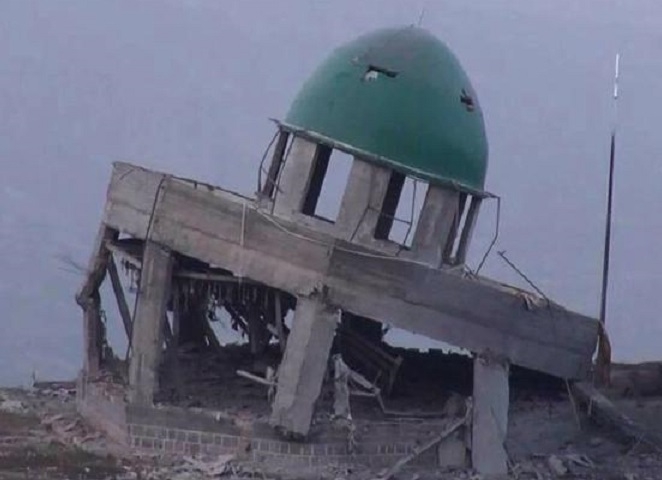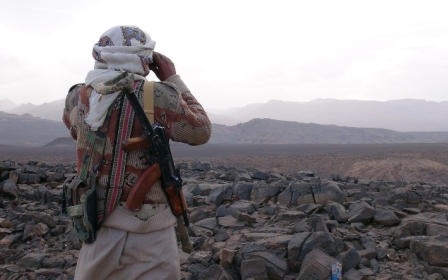Bombing Houthi’s shrine creates fears of sparking sectarian war

SANAA - Until Thursday night, Yemeni activist Majed Ameen was a staunch supporter of the Saudi-led coalition airstrikes against Houthis in Yemen who have forced President Abd Rabbuh Mansour Hadi to flee the country.
His stance had changed by Friday morning, when warplanes targeted the shrine of Hussein Badreddin al-Houthi.
"I thought the war was to restore the mandate from the hands of Houthis to the legitimate President Hadi, but targeting al-Houthi's shrine must have another purpose, which I think is sectarian,” Ameen told Middle East Eye.
The Houthis are a Zaidi Shiite group, based in northern Yemen, that seized power in the capital Sanaa last September. They have since advanced across the 55 percent Sunni-dominated country to the southern capital, Aden, with, it is widely believed, the backing of Iran.
On 26 March, a coalition led by Saudi Arabia launched air strikes against the Houthis and Yemeni army units allied to them and loyal to ex-president Ali Abullah Saleh. The strikes were intended to help restore the Hadi government.
New MEE newsletter: Jerusalem Dispatch
Sign up to get the latest insights and analysis on Israel-Palestine, alongside Turkey Unpacked and other MEE newsletters
The destruction of the shrine - which involved 14 separate airstrikes, the Houthi-owned Al-Massirah television reported on Friday - came as Saudi Arabia was also stepping up attacks on Houthi positions last week after the group fired shells into neighbouring Saudi Arabia.
A Houthi spokesperson called the destruction of the shrine of their founder a "cowardly" step, and in response to the attack, the group has threatened to go inside Saudi territory.
"I do not know what the advantage of targeting a shrine, however this is their policy that they destroy everything in front of them," Ali Al-Qahoom, a member of the Houthis's political office told MEE.
Ameen, the activist, said the targeting of the shrine is a “deviation from the acceptable path, and [a] clear indication of intellectual [ideological] reasons” behind the Saudi action. For this reason, he argued, the country should reject the Saudi-led attacks.
Ameen also opposed Houthi bombing of mosques and houses where the Koran is taught, both places considered by Muslims to be holier than shrines. None of them should be targeted by either side in the conflict, Ameen said.
Hussein Badreddin al-Houthi, the founder of the Houthi group as a religious movement and a member of Yemen’s parliament for four years in the 1990s, was killed in 2004. He was the elder brother of the present Houthi leader, Abdulmalik Badreddin al-Houthi.
The government, then under president Saleh, kept his remains in an unknown location for nine years. In June 2013, they were finally buried in the Marran mountains in the Saada governorate, north of Sanaa, where al-Houthi had worked to create a more religiously devout society.
Houthis considered the release of the remains to be a triumph of their movement and the building of a shrine to be a symbol of their success.
Non-Houthis struggled to see any gains from the attack.
The shrine’s destruction will likely result in revenge attacks, according to Nora al-Jarwi, head of the 14 February movement. The group was established last year by young Yemenis who were against the outcomes of the national dialogue that ended in January 2014 and felt the 2011 uprisings had failed to achieve their goals.
“In my life, I learnt a wisdom that is during war people should not underestimate the holiness of the religious beliefs of others, because people are willing to defend them and fight to the death,” al-Jarwi told MEE.
Al-Jarwi said she has sympathy for the civilians and the displaced people caught up in the present conflict but deaths and homelessness are inevitable with war. Targeting religious symbols, however, is an intentional provocation, she said.
Amjad Khoshafa, an anti-Houthi journalist, said that there is no value in destroying a shrine, only an emotional gain for the Saudi-led coalition that will negatively affect the Houthis.
"Targeting the shrine came after the Houthis targeted Najran district in Saudi Arabia, which caused an embarrassment to the Saudi forces at not being capable of protecting their border. This made the Saudi forces react by destroying the most important holy symbol for the Houthi group,” Khosafa told MEE.
The destruction of the shrine is an act that will be viewed by coming generations as a symbol of violence against the Yemeni people, Khoshafa said.
Akram al-Sharjabi, an activist who helps find housing for displaced people in Sanaa, said targeting the Houthi shrine will be in the group’s best interest because it will garner sympathy from the public for the group.
But potential short-term gains aside, al-Shariabi said, there is no advantage in targeting shrines in Yemen or Saudi Arabia. Instead, all sides needed to focus on coexisting.
"We can say this is one of the war’s mistakes, which supporters of the Houthis will not forget for generation after generation,” he said.
However, several people with whom MEE spoke said they supported the attack on the shrine as a way to send a message to the Houthis that they are not the only powerful force in the field. None were prepared to speak on record for fear of Houthi retaliation.
Aida al-Adimi, professor of sociology at Taiz University, told MEE that the attack will further polarise divisions in the country’s social fabric.
"The criticism of different sides for targeting religious symbols is a normal reaction, and this step will make Houthis feel that the [wider Yemeni] society is against them politically and not ideologically,” al-Adimi said.
Middle East Eye delivers independent and unrivalled coverage and analysis of the Middle East, North Africa and beyond. To learn more about republishing this content and the associated fees, please fill out this form. More about MEE can be found here.




